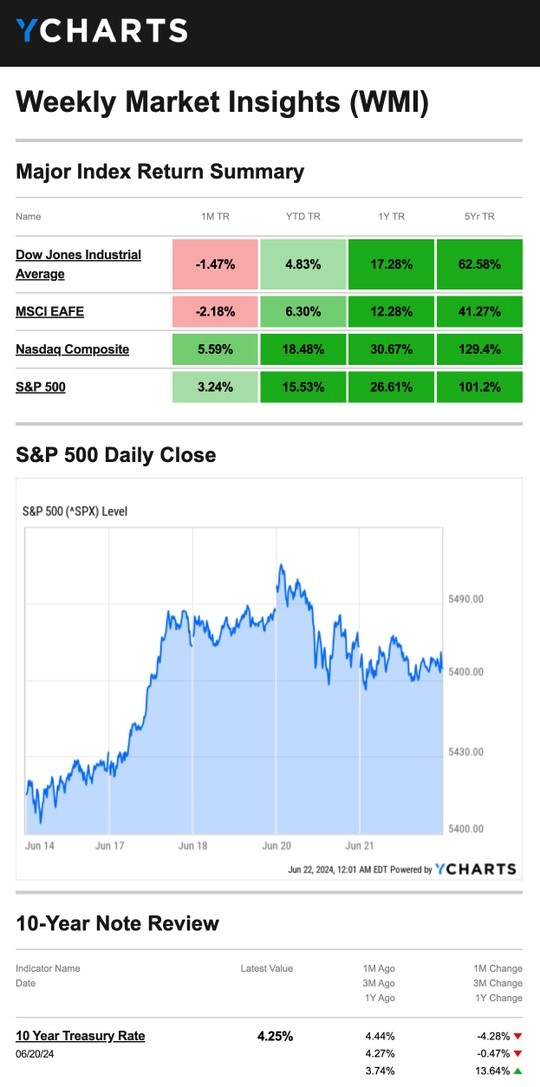Stocks edged higher over the four trading days last week, with the three major averages taking turns leading based on various economic and artificial intelligence (AI) news.
The Dow Jones Industrial Average rose 1.45 percent–its best week since May–while the Standard & Poor’s 500 Index gained 0.61 percent. The Nasdaq Composite, which has led all year, ended flat. The MSCI EAFE Index, tracking developed overseas stock markets, rose 0.94 percent for the week through Thursday’s close.1
Mixed Economic News
All three averages began the week with gains, including new highs for the S&P 500. However, stocks posted only modest gains on Tuesday as mixed economic data came in. Retail sales rose 0.1 percent—less than expected, although better than in April when sales fell.2,3,4
Markets were closed for the Juneteenth holiday on Wednesday.
As the week ended, it was the Dow’s turn to lead as sentiment shifted on mega-cap tech names as investors again questioned the sustainability of AI market drivers. Home prices hit a new high in May—this, paired with high mortgage rates, caused existing home sales to fall for the third consecutive month.4,5

| Source: YCharts.com, June 22, 2024. Weekly performance is measured from Friday, June 14, to Friday, June 21. TR = total return for the index, which includes any dividends as well as any other cash distributions during the period. Treasury note yield is expressed in basis points. |
A Notable AI Driver
Some investors and market analysts are examining the underlying long-term drivers of AI more closely, given its outsized impact on market averages like the S&P 500 and Nasdaq.
One such underlying driver is “DRAM”: Dynamic Random Access Memory, the AI-turbocharged version of a RAM semiconductor, more commonly referred to as “memory chips.” Companies making DRAM chips are an essential part of the AI ecosystem. Expect attention to shift to prominent DRAM players as they report earnings in Q2.6
The FOMC kept rates steady at the current 5.25-5.50 percent target range, a widely expected decision. However, the tame CPI report caused some volatility as investors grappled with how the report may influence Fed policy.7,8
This Week: Key Economic Data
Tuesday: Consumer Confidence. Case-Shiller Home Price Index.
Wednesday: New Home Sales.
Thursday: Gross Domestic Product. Jobless Claims. Durable Goods Orders. International Trade in Goods.
Friday: Personal Income and Outlays. Consumer Sentiment.
Source: Investors Business Daily – Econoday economic calendar; June 21, 2024
The Econoday economic calendar lists upcoming U.S. economic data releases (including key economic indicators), Federal Reserve policy meetings, and speaking engagements of Federal Reserve officials. The content is developed from sources believed to be providing accurate information. The forecasts or forward-looking statements are based on assumptions and may not materialize. The forecasts also are subject to revision.
This Week: Companies Reporting Earnings
Tuesday: FedEx Corporation (FDX), Carnival Corporation (CCL)
Wednesday: Micron Technology, Inc. (MU), Paychex, Inc. (PAYX), General Mills, Inc. (GIS)
Thursday: NIKE, Inc. (NKE), McCormick & Company, Incorporated (MKC, MKC.V), Walgreens Boots Alliance, Inc. (WBA)
Source: Zacks, June 21, 2024
Companies mentioned are for informational purposes only. It should not be considered a solicitation for the purchase or sale of the securities. Investing involves risks, and investment decisions should be based on your own goals, time horizon, and tolerance for risk. The return and principal value of investments will fluctuate as market conditions change. When sold, investments may be worth more or less than their original cost. Companies may reschedule when they report earnings without notice.
1. The Wall Street Journal, June 21, 2024
2. CNBC.com, June 17, 2024
3. The Wall Street Journal, June 20, 2024
4. MarketWatch.com, June 18, 2024
5. The Wall Street Journal, June 21, 2024
6. MarketWatch.com, June 20, 2024
7. IRS.gov, January 12, 2023
8. Prevent Cancer Foundation, January 29, 2023
Investing involves risks, and investment decisions should be based on your own goals, time horizon, and tolerance for risk. The return and principal value of investments will fluctuate as market conditions change. When sold, investments may be worth more or less than their original cost.
The forecasts or forward-looking statements are based on assumptions, may not materialize, and are subject to revision without notice.
The market indexes discussed are unmanaged, and generally, considered representative of their respective markets. Index performance is not indicative of the past performance of a particular investment. Indexes do not incur management fees, costs, and expenses. Individuals cannot directly invest in unmanaged indexes. Past performance does not guarantee future results.
The Dow Jones Industrial Average is an unmanaged index that is generally considered representative of large-capitalization companies on the U.S. stock market. Nasdaq Composite is an index of the common stocks and similar securities listed on the NASDAQ stock market and is considered a broad indicator of the performance of technology and growth companies. The MSCI EAFE Index was created by Morgan Stanley Capital International (MSCI) and serves as a benchmark of the performance of major international equity markets, as represented by 21 major MSCI indexes from Europe, Australia, and Southeast Asia. The S&P 500 Composite Index is an unmanaged group of securities that are considered to be representative of the stock market in general.
U.S. Treasury Notes are guaranteed by the federal government as to the timely payment of principal and interest. However, if you sell a Treasury Note prior to maturity, it may be worth more or less than the original price paid. Fixed income investments are subject to various risks including changes in interest rates, credit quality, inflation risk, market valuations, prepayments, corporate events, tax ramifications and other factors.
International investments carry additional risks, which include differences in financial reporting standards, currency exchange rates, political risks unique to a specific country, foreign taxes and regulations, and the potential for illiquid markets. These factors may result in greater share price volatility.
Please consult your financial professional for additional information.
This content is developed from sources believed to be providing accurate information. The information in this material is not intended as tax or legal advice. Please consult legal or tax professionals for specific information regarding your individual situation. This material was developed and produced by FMG Suite to provide information on a topic that may be of interest. FMG is not affiliated with the named representative, financial professional, Registered Investment Advisor, Broker-Dealer, nor state- or SEC-registered investment advisory firm. The opinions expressed and material provided are for general information, and they should not be considered a solicitation for the purchase or sale of any security.
Copyright 2024 FMG Suite.


